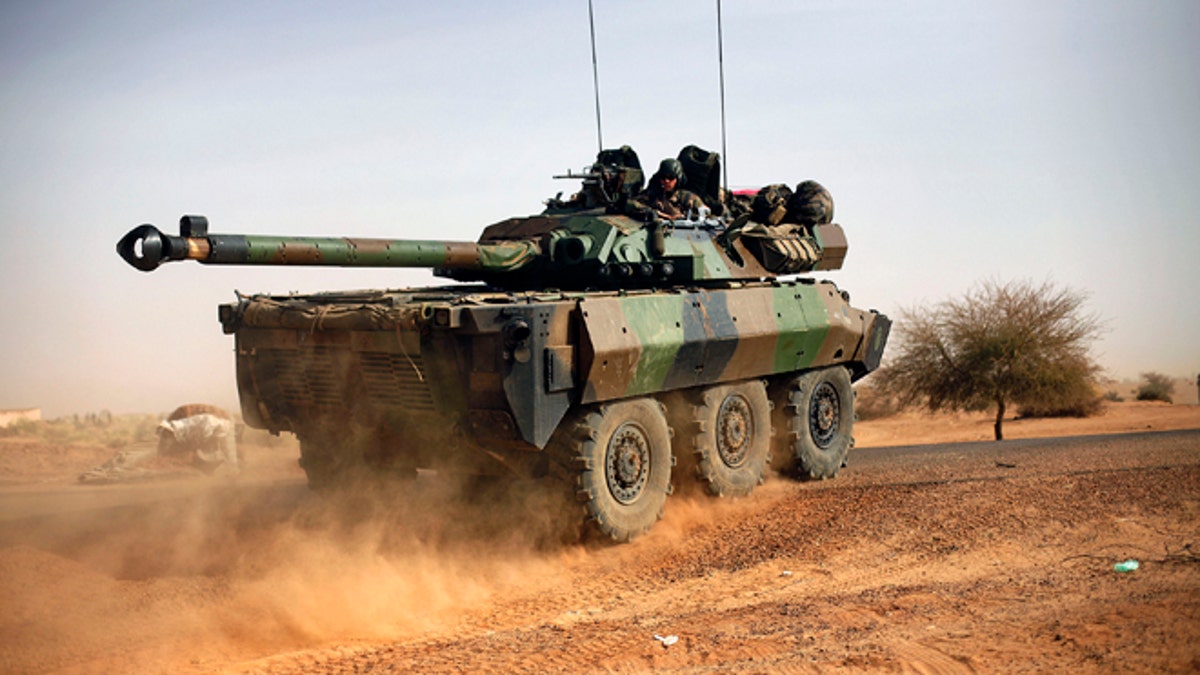
Feb. 6, 2013: A French tank is seen heading north at the tail end of a 60-plus military convoy in Gao, northern Mali. (AP)
Hundreds of Islamist militants have been killed in Mali by French troops, France’s defense minister said.
Jean-Yves Le Drian said "several hundred" militants died in airstrikes on vehicles carrying fighters and during combat with French forces, resulting in “great damage on the jihadist terrorist groups," the BBC reports.
It is unclear how France came up with the death total, but the country says only one of its own -- a helicopter pilot -- has died since its Jan. 11 intervention.
France has around 4,000 troops on the ground in Mali alongside forces from the African Union, while it estimates that the Islamist groups are 3,000 fighters strong, the BBC reports.
France, fearing Mali was becoming a haven for international terrorists, became involved in the conflict after Islamist extremists started moving toward the capital.
President Francois Hollande said Wednesday France may start pulling out its troops out of Mali at the end of March.
Government spokeswoman Najat Vallaud-Belkacem added that at a Cabinet meeting, Hollande "confirmed that if all goes as planned, by the end of March the number of French troops engaged in Mali can begin to diminish."
Vallaud-Belkacem said the pullout will depend on an increase in the deployment of African forces, who are meant to take over the international effort to secure Mali and help its weak army keep the peace.
The United Nations Security Council is scheduled to hold private consultations on Mali on Wednesday. The Security Council is likely to wait until the end of February to adopt a new resolution authorizing a U.N. peacekeeping force for Mali, a well-informed U.N. diplomat said, speaking on condition of anonymity because of the sensitivity of the issue.
France is expected to keep a rapid reaction force in Mali to back up the U.N. force, two U.N. diplomats said.
French forces are now clashing with Islamist militants who have been firing rocket launchers in the northern Malian city of Gao.
Jean-Yves Le Drian said French aircraft are continuing airstrikes every night on suspected militant arms depots and mine-making sites.
Malian soldiers on Wednesday found a stash of industrial-strength explosives in Gao that can be used to make roadside bombs.
Soldiers, patrolling on foot, made the discovery after a local official alerted them to the scene.
An Associated Press reporting team also viewed the stash of Nitram 5, which had been hidden inside rice bags that were dumped in a small square with other garbage from the town.
Groups of Malian soldiers on foot were called out to several sites Wednesday, including one building where they found grenades alongside a large suitcase and reading material in Arabic script about Shariah law. At another site, they called in a bomb team after finding what appeared to be a booby-trapped vehicle.
There have been concerns of a counterinsurgency in the weeks since French troops took over the cities of Timbuktu and Go, especially after four Malian soldiers were killed when a land mine went off near their vehicle.
A secular rebel movement fighting for a separate nation for Mali's minority Tuareg nomads claims it is holding several smaller northern towns, including Kidal, even though French and Chadian troops entered the city Tuesday.
Moussa Ag Assarid of the National Movement for the Liberation of Azawad, or NMLA, said their fighters also are holding the northeastern towns of Tessalit, Menaka, Aguelhok and Tinzawatten. Azawad is what the Tuaregs call their homeland.
Mali army national spokesman Diarran Kone refused to comment on the NMLA claims, saying only that "the re-conquest is continuing." It was not immediately possible to verify the NMLA claims. Phone networks remained down in the area.
Trouble began last year in Mali, once a stable democracy in West Africa, with the latest in a series of Tuareg rebellions in the north. The Malian army staged a coup in the faraway capital, Bamako, and in the chaos that followed, the Tuaregs and Islamic extremists made rapid advances, seizing the main cities in northern Mali. Poorly armed and demoralized Malian soldiers fled before their advance.
But the secular fighters fell out with the Islamist extremists. As the extremists have fled the French bombing campaign, it appears the NMLA fighters have moved back into some areas.
They have said they are willing to work with the French forces but not Malian troops, whom they accuse of committing reprisals against the lighter-skinned Tuaregs and Arabs.
The Associated Press contributed to this report.
